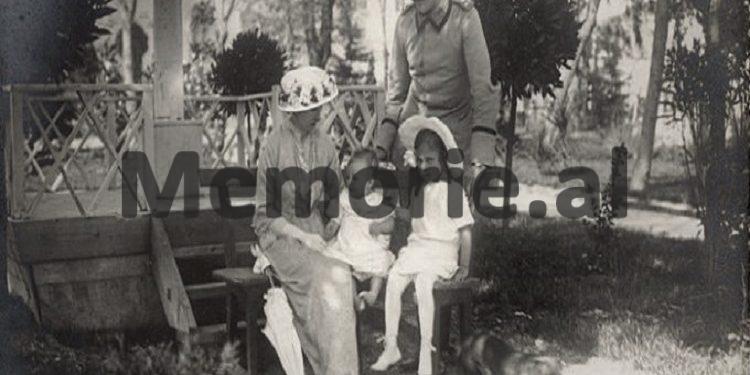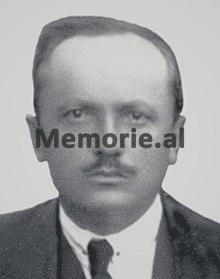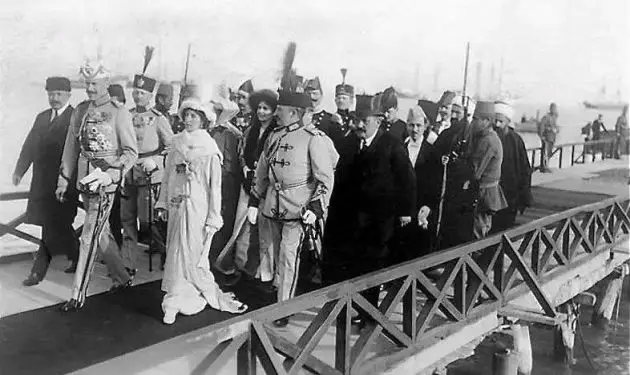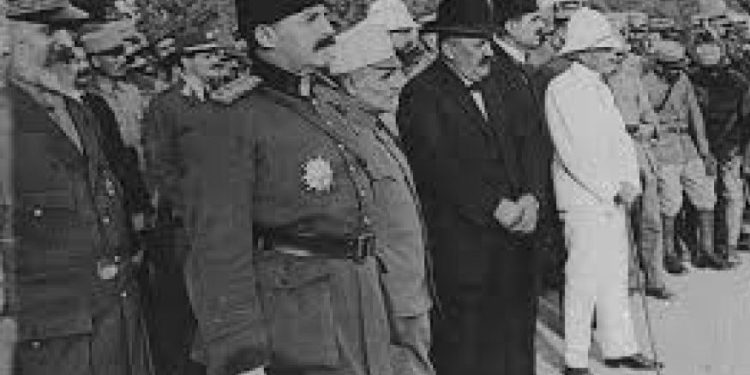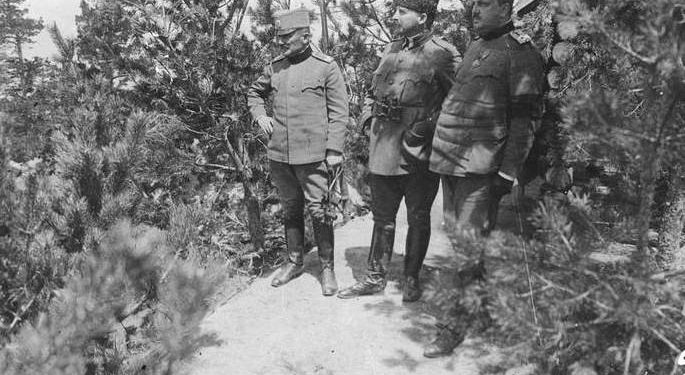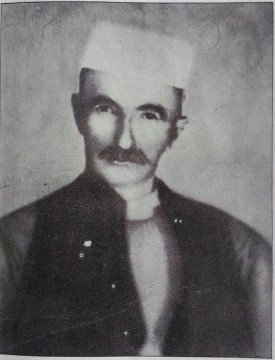By Sejfi Vllamasi
The fifth part
Memorie.al / From all the provinces of Albania, people’s delegates and a majority of patriots arrived, from inside and outside Albania, and on November 28, 1912, amid great enthusiasm, after 450 years of captivity, the flag was raised national and the independence of Albania was declared. A government was formed under the chairmanship of Ismail Qemali, in which Preng Bibdod Pasha also participated as deputy prime minister and Esat Pashë Toptani as minister of the interior. When Ismail Qemali arrives in Vlora, Seit Qemali, Murat Tërbaçi, Alem Mehmeti and many other patriots, as reservists, fought against the Greek army in Llogara. These, upon being informed about the purpose of the Elder’s arrival in Vlora, raised the national flag at the front of the war, before it was raised in Vlora.
Continues from last issue
These massacres are carried out by Captain Stratos. The old patriot Harri Panariti, together with another patriot from Treska, wrote in America about the tragic events of Panariti, and with this announcement came a foreign commission of two people for investigations. Stefan Panariti, did not call Agana Panaritas with the intention of betrayal. Three Panarita Christians testified to this, in front of the Greek government in Ioannina. It was established that the hero of this tragedy, Captain Stratos.
Even Harri Panariti, because he informed his friends in America, was sent to Ioannina, from where he was released only after 6 months of imprisonment, even thanks to a thousand gold francs, which he paid in hand. This is how the attempt to liberate the prefectures of Korca and Gjirokastra came to an end. The Greeks reached their goal, occupying the line Llogara – Salari – Qafa e Kiçoku – Ostrovica – Maliq.
***
The Young Turks, applying the “Divide and Rule” principle, incited Albanians of different faiths against each other, in any way. As for the Orthodox, they were pushed to do common things with the Greeks as co-religionists that they were. The Muslims approached them, giving them some other officials. Thus the Young Turks achieved their goal to some extent and for a time, more or less long.
The first contradictions between the Orthodox and the Muslims, over time, transformed into resentment and, later, into mutual enmity. This great gap that was opened between Christians and Muslims, by the common enemy, could not be understood quickly by the Albanians and caused great damage to the nation, resulting, among other things, in the denationalization of hundreds of thousands of Orthodox Albanians this process continues even today in Arbëri (Albanians of Greece).
With the National Renaissance, both the revivalists and their successors had to work hard, time and sacrifice to fill the gap of separation that the foreigners had opened. In this path of separation, the Fanari (Patricana of Istanbul) and later the Greek governors have been more diligent than the Turks.
The Serbian attempt with Arif Hiqmet
At the beginning of 1914, the Serbs withdrew from Dibra, imposed by the Great Powers, and the demarcation line was placed near the city of Dibra. Then the exiled Dibran people returned to their country, finding it transformed into ashes.
With the arrival of Vidi in Albania, the local government was also formed in Dibër and Jusuf Hipen Agolli was appointed as prefect of the District. The country’s gendarmerie was also formed, having as a distinctive sign, a red and black stripe on the arm, which (the gendarmes), the people still called zapite. The Serbs wanted to form a government of the Zografos type, which would include Dibra and Mati, taking into their hands the Murra Pass, the Bualli and the Lumnik Scale, which were of great strategic importance. Pashiq, the Serbian prime minister, needed a tool to use for this purpose, which he found in the person of Arif Hiqmet, an Albanian from Kumanovo, a smart and first-class adventurer.
He was the secretary of the Prefecture of Dibra for 2-3 consecutive years before the Balkan War and in 1905-1906; he was the third secretary of Hysen Hilmi Pasha, the general inspector of the three vilayets and the chairman of the commission, which represented the Great Powers, for reforms in Macedonia. I knew this person at that time in Manastir, and I noticed that there was no patriotic feeling at all.
Arif Hiqmeti in Dibër did not find even the slightest support. Only with a lot of money, the Lleshi, Halit and Liman Lleshi families, as well as a certain Ismail Lazri, another smart guy, were able to make a living. With the help of these and with very large amounts of money, he was able to buy people in several villages of Dibra. The Serbian government was behind the curtain, wanting to show that it supposedly does not interfere in these affairs.
Halit Lleshi, gets rich enough and having the support of the enemy power, he was able to make for himself a small part of the people and thus comes to the square, an opposing party with Arif Hiqmet at the head. With this minority, supported by the enemy, he was able to conquer all of Dibra, and as soon as he crossed the demarcation line, the war began, first with the local gendarmerie, which was helped by the Dibra patriots. Thus began the civil war, which continued for 3-4 months.
Arif Hiqmeti one day, going from Dibra to Skopje, near the village of Zharmonic in Reka, was killed by a group of patriots from Dibra, consisting of Hasan Pallanza, Izet Maqellara, Maliq Kirçishti, Qamil Daci, etc. The war ended with the victory of the Dibra patriots and with the killing of Aarif Hiqmet, his group was completely destroyed. After the murder of Arif Hiqmet, the Serbian government sent with that mission, a certain Xhemal Kosturi and Nikoll Kirçishti, but these two also went bankrupt in their missions.
Revolutionary Organization “National Wing”
At the time of Vidi’s reign, the majority of Albanian patriots, who were in Albania and outside Albania, among the different countries of the world, gathered in Durrës, with the aim that everyone would give their contribution to stabilize the new state Albanian. These idealists, mostly young and full of enthusiasm, not only didn’t know the people and their customs, but they didn’t even know each other.
So, in order to get to know each other better and better, especially at work, and to transform individual powers into a well-organized and disciplined collective power, there was an imperative need to form a political-revolutionary organization. secret, with the name “National Wing”, which included all the nationalists of that time, old and young, civilians and military.
This organization, after Vidi’s departure, when the great majority of nationalists gathered in Shkodër, expanded better there and, as will be seen later, it became the promoter of all national movements, in the stabilization of the new state in 1924.
With the occupation of Vlora by the rebels (at that time I was there coming from Durrës to meet my family in the olive groves of Vlora, who had emigrated from Cologne burned by the Greeks, and I barely escaped the pursuit of the rebel police commissioner, Shero Emini, managing to catch the last steamer to Durrës), all of Central Albania and up to Ura e Maliqi came under the jurisdiction of their government system. They were militarily organized and strengthened so well that the government of Vidi was not able to withstand the danger that was threatened by them.
The Six Great Powers, which had created and guaranteed the new state, had gone to war against each other. Austria and Italy had helped the new state financially and now they would not be able to help it anymore. So in these conditions, internal and external, Vidi, the government and his supporters could not cope with the situation, so, advised by Austria, on September 3, 1914, Vidi left Albania. A part of the Albanian patriots, emigrants outside Albania, while the majority, with whom I was also myself, went and took refuge in Shkodër.
***
What caused this tragedy?
What are the causes of this tragedy that was played out at the expense of this small and weak people? These are internal and external.
Internal causes. Albania, with the decision of all the Great Powers, at the London Conference, was created as an independent state, but in reality the Albanian people were politically unprepared for such independence. Despite the fact that in the soul of the people, the feeling of independence has always existed and has even been developed in a pronounced way, it has been somewhat primitive, individual and to some extent, provincial and irrational and national, in order to adapt to the conditions and the demands of the time.
National consciousness, the most important element for the independence of a nation, has been unformed in the Albanian people, as the policy of Turkish denationalization has created all sorts of difficulties to leave it in a medieval lethargy. By preventing it from rising to the level of the neighboring peoples, the Young Turks believed that they destroyed the possibilities of its independence, which would be a deadly example for the future of the Ottoman Empire.
For old and new Turks, the Greekization and Slavization of Orthodox Albanians, through the church and school, was more preferable than for them to become good Albanians and, under a suitable administration and in the interest of both parties, prefer to live with Turkey until they matured for independence.
In addition to the denationalization policy of the Turks, the Albanian people, due to topographical reasons of the country, divided into provinces separated from each other, have led a separate life and as a consequence very harmful for their future. On the other hand, during its history, the Albanian people have also undergone other social changes in the change of beliefs, which has made the process of forming national consciousness even more difficult.
The Ottoman Empire was based on religion, not on nationality like that of Austria-Hungary. In which, in theory, Albanian Muslims have enjoyed more rights than Christians. Every Mohammedan Albanian, as an individual, was recognized with every right that even a Turk had, while, as a nationality, he was not recognized with any rights. In reality, only a small part of the Mohammedan Albanians have gained positions of importance and secured colossal wealth, becoming servants of the sultans and rendering them great services.
These have managed to increase their wealth by means of robberies and exploitations, which they have done to the people. These leaders, with the economic means at their disposal, were able to create privileged positions in general, to the detriment of the people. While the vast majority of the Muslim people, in addition to the right to become a gendarme, to leave their heads in pursuit of thieves, had all kinds of obligations (except for the mountainous part of Northern Albania), both payments and many years of military service, leaving the remains between the wars, and especially between the frequent uprisings in the deserts of Arabia.
For the Muslim Albanians, emigration outside the empire has been prohibited, which has deprived them of the material and especially moral gains derived from emigration, being in contact with the outside world. The Great Powers at the London Conference in 1913, on the Albanian issue, were divided into two: Austria and Italy, who supported the Albanian reclamation based on the rights of the peoples, supporting Albania all the countries that have been majority inhabited by Albanians ; and, on the other hand, Russia with France, who, based on historical rights, demanded Shkodra, for Montenegro, Kosovo and an exit to Central Albania, to the Adriatic, for Serbia, as well as in the South, the Greek claims, in the name of the Albanian Orthodox Church over Epirus, Korça and Gjirokastra.
Both in the creation of the state and in the assignment of borders, the Albanian people were not asked. These limits were set on the basis of the policy of balance, not on the principle of rights. Russia and France satisfied the Greek-Serbian-Montenegro aspirations, robbing the most fertile and prosperous provinces of Albania, Kosovo and Chameria. On the other hand, they accepted the Albania of 1913, with insufficient economic opportunities, which they created in order to destroy it at the first opportunity, with the arrival of Vidi in Albania.
The war between the two blocs became even fiercer, wanting each side, like the Entente, like the Tripartite, to pull Greece into their orbit. And that the two sides, to show themselves benevolent towards Greece, even Italy and Austria, put pressure on the Albanian government to sign the Corfu protocol on June 23, 1914, which it categorically rejected, when it was under conditions of favorable. Austria supported Vidi, the majority of Beylers and the nationalists, while on the other side, France with Russia, supported Esat, to make him head of state, in a Mohammedan Albania, between Vjosa and the river Mati, satisfying on this occasion, also the aspirations of the Greek- Serbo-Montenegro.
Italy has supported, unlike Austria, both Esat and Ahli Kijami. The people of Central Albania incited and fanaticized by the Assadist, Turcophile and Young Turk propaganda, threw them into a war without reserve against the new state, against Vid, to unite again with Turkey, or at least for a Muslim king. This uprising took place at a time when the Greeks attacked Korça and Gjirokastra, leaving the people of the South between two fires and, causing the burning of hundreds of peasants, the two most flourishing provinces of Albania.
All measures taken by Vid’s government to suppress the uprising failed. This failure was caused, more than by betrayal, by the incompetence of the leaders, by the lack of organization, discipline and determination of the fighters, without an ideal and on the other hand, by the gendarmerie, organized by the Dutch military mission and the civil powers endowed with a patriotic ideal, were engaged in the war against the Greeks. Therefore, the rebels, fanaticized and disciplined, defeated the government forces and in a short time, invaded Central Albania up to Vlora, Berat and Maliq.
So that the Albanian people, composed, at that time, of a minority of patriots and intellectuals, of a generally corrupt party and of an undeveloped mass, was neither able nor given time to adapt the situation created with the new state, to face the coalition of external and internal enemies.
After the Great Powers that created the new state went to war with each other, in these conditions it was impossible for Vidi and his government to stay in power and, following the advice of the Austrian government, he, on September 3, 1914, was left Albania and the insurgents entered Durrës on September 5, after two days.
Esado-rebel wars
Esati, on August 18, 1914, leaves Naples for Paris, where he agreed with the French Government, to enter the war against the Central Governments. Later he goes to Athens, where, after dealing with the Greek Government, he goes to Serbia. And there, with the agreement he made with Pashiq and the enemies of Albania, he closed the cycle of agreements based on which he secured the help of the governments in question and, in order to implement his plans, he moved to Thessaloniki. Here, with the mediation of the Serbian prefect of Dibra and through correspondence, he got to know some of the leaders of Dibra. Here in Drini, Dibra was in the hands of Jusuf bey Dohoçishti, who had organized an autonomous government. Esati, after meeting with this and other chiefs, came to the city of Dibra.
Jusuf Bey had gathered 300 volunteers. Xelal Zogolli and Ceno beji Golja, leave with 200 people from Peshkopi to Dibër, to escort Esat from Dibra to Peshkopi. On the road near Maqellara, a group of Albanian nationalists: Ramis Daci, Izet Maqellara, Maliq Kirçishti, Hasan Pallanza and others, ambushed him to kill him, but the other side, more powerful, pulled them out of the ambush and freed the way. Esati held a meeting in Peshkopi. Some of the leaders were against Esat, as it had come to Albania from Yugoslavia, with which they have always been at war. On the other hand, he formed a force of over 3,000 people, paid the leaders according to the positions they had and gave volunteers from two Napoleons.
Esati in the Murra Pass left for Mat. Although the bird had refused to participate in this dance, together with 30-40 people from Mati’s pariah, he came forward to Qafë i Murra. After embracing, Zogu left and came to Lis t Mati, to Kurt aga Kadija’s guest house. The bird had Shahin bey Dino and Stavro Stavrin with him. Talks were held between Esat and Zogu, and the first asked for his participation in this dance, but Zogu replied thus: “Oh, uncle, since you have started this work, I am raising my hands and saying ishallah. When I find out that you have reached your goal, I will say marshallah”.
Esati was very angry at this answer, immediately ordered to prepare the force and continue on the way. But Zogu immediately told him: “According to the habit of Albanians, after passing through our lands, I must drink coffee, so tonight, we are going to Burgajet”. Esati went to Burgajet, where Zogu kept all his power at his own expense. Esati still tried to convince Zogu to participate, but he categorically refused.
Jelal Zogu gathered 1000 Matians and joined Esat, but none of the leaders of Mat was with him. They went to Patin to Çelaj and from there to Ura’s bazaar for lunch. Here, Mersin and Shaqir Dema set up an ambush to kill him, but their uncle, Sheh Lula, of Zerqan, understood the plot and, as his nephew who had them, chased them away from the ambush.
Esati came to Selitë e Keqe village, in the highlands of Tirana. The next day he marched on Tirana and from Shkalla e Tujani, he took Priska Pass, Dajti Mountain and Shkalla Mountain. After the rifle started from all sides, this one, riding the horse in front of the 500 chosen people, started towards Shkalla. Abdi Feza from Bastar in Tirana was with 500-600 people in Grykë t Shkalla, to oppose Esat. But this one, instead of opposing him, out of fear fell at his feet and welcomed him. Esati, putting him in front of the horse, entered Tirana with his own strength without a rifle.
The leaders of Ahl al-Qiyam escaped. Esati stayed in Tirana for three days. He kept the power at his own expense and the volunteers, after being paid a salary, directed them towards Durrës. His force, at Man Picari’s inn, encountered a large rebel force under the command of Picari Man. The latter were destroyed. The second obstacle was Shijak, where you see Hamdiu with the people of Shijak, resisting like a fortress.
Esat with his usual cunning, through a delegation, was able to convince seeh Hamdi to seek cooperation with Esat. So also Shijak, was passed without any danger. The last and fiercest war took place in Rushbull, where the people of Shijak and Kavaja fought heroically, as well as the Dibrans on the other hand, who left 86 dead, to finally enter Durrës, on October 3, 1914.
The leaders of Ahli Kijam, except Sheh Hamdi, Mustafa Ndroqi and Hoxha Leçini, remained on the run. Esati immediately elected and convened a senate, from among the leaders he himself desired, in Bumçi’s house, and with the threat of the Dibra powers, which he brought into the Assembly Palace, forced them to elect him as the head of the Government of Central Albania and commander-in-chief of the army.
Esati immediately declared war on Austria. He formed a government composed of general directors: the prime minister himself and commander-in-chief, for Foreign Affairs, Shahin Dinon, for Finance, Nexhat Libohova; of the Interior, Faik Kodra (dibran) and army commander, Isuf bey Dibran. He immediately formed the political court with Chairman Xelal Zogun, prosecutor Ilia Llavda (Durresak) and investigator Hysen Myshqetan. Memorie.al
The next issue follows




